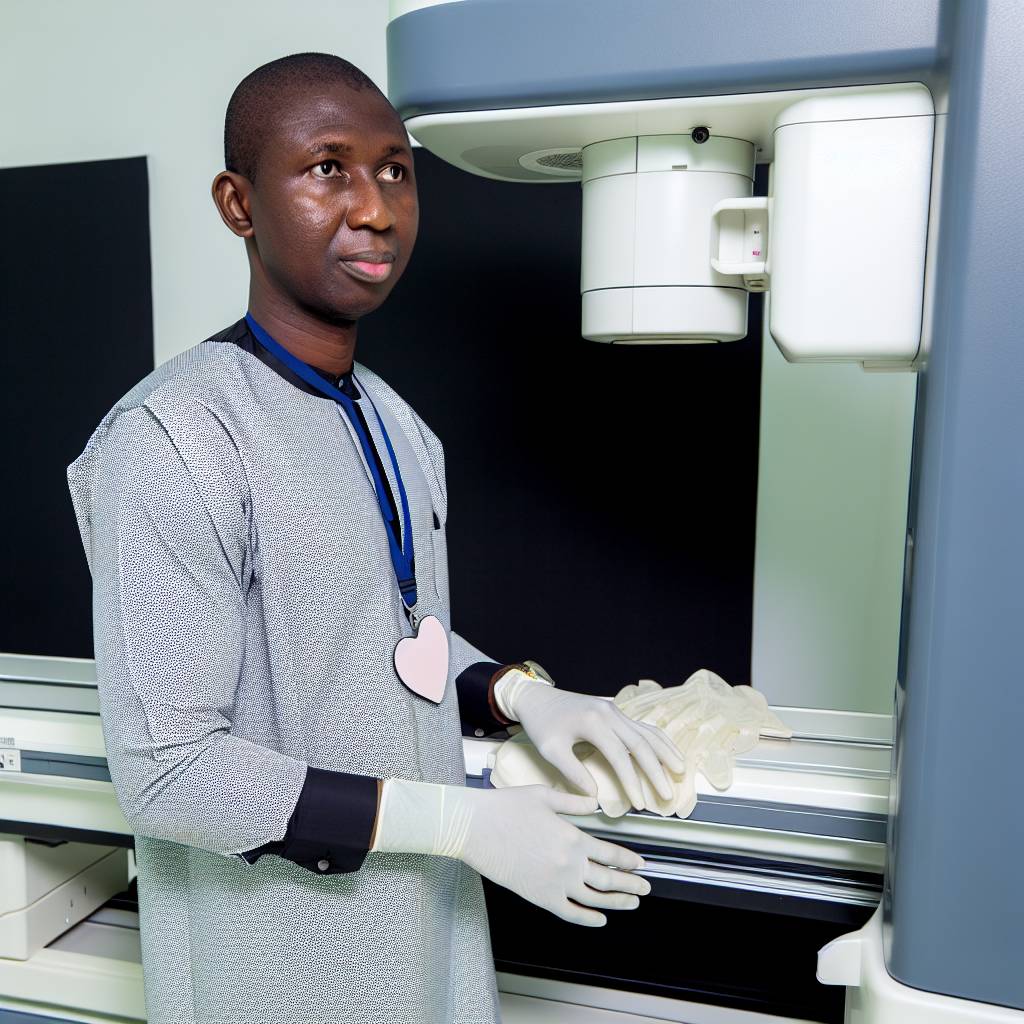Introduction
Radiography is a crucial aspect of the healthcare system.
It provides diagnostic imaging for patient care.
Ethics and best practices play a significant role in ensuring quality and safety in radiography procedures.
Currently, the situation of radiography ethics in Nigeria is a topic of concern and discussion.
The role of ethics in radiography
Definition of ethics in radiography
Ethics in radiography refers to the moral principles and values that guide the conduct of radiographers in their professional practice.
It encompasses the standards of behavior that radiographers are expected to adhere to while performing their duties.
Importance of ethical guidelines for radiographers
Ethical guidelines play a crucial role in ensuring that radiographers maintain the highest standards of professionalism and integrity in their practice.
These guidelines serve as a framework for ethical decision-making, guiding radiographers on how to conduct themselves in various situations that may arise during patient care.
Adherence to ethical guidelines helps to safeguard the welfare and rights of patients, ensuring that they receive the highest quality of care without any compromise on safety or confidentiality.
It also fosters trust and confidence in the healthcare system, as patients rely on radiographers to prioritize their well-being above all else.
Discussion on the ethical responsibilities of radiographers in Nigeria
Radiographers in Nigeria have a set of ethical responsibilities that they must uphold to maintain the trust and respect of their patients and colleagues.
These responsibilities are outlined in the code of ethics for radiographers in Nigeria, which provides guidance on the professional conduct expected of radiographers.
Some of the key ethical responsibilities of radiographers in Nigeria include:
- Respect for patient autonomy and dignity: Radiographers must treat patients with respect, dignity, and compassion, honoring their right to make informed decisions about their care.
- Confidentiality: Radiographers must maintain the confidentiality of patient information at all times, ensuring that sensitive medical information is not disclosed without the patient’s consent.
- Professional competence: Radiographers must strive to maintain the highest level of competence in their practice, continuously updating their skills and knowledge to provide quality care to patients.
- Ethical use of resources: Radiographers must use healthcare resources responsibly, ensuring that equipment is used efficiently and that patient care is not compromised due to inadequate resources.
- Professional conduct: Radiographers must conduct themselves professionally at all times, interacting with patients, colleagues, and other healthcare professionals in a respectful and courteous manner.
By adhering to these ethical responsibilities, radiographers in Nigeria can uphold the integrity of their profession and contribute to the delivery of safe and ethical patient care.
Best practices in radiography
Best practices in radiography refer to the guidelines, standards, and protocols that ensure optimal patient care and safety during diagnostic imaging procedures.
Following best practices in radiography is crucial for ensuring the safety and well-being of patients undergoing diagnostic imaging.
By adhering to established protocols, radiographers can minimize the risk of errors, reduce exposure to radiation, and improve the overall quality of care provided to patients.
Examples of best practices that should be followed by radiographers in Nigeria
- Proper patient identification: Radiographers in Nigeria should always verify the identity of patients before performing any imaging procedures to prevent errors and ensure accurate results.
- Radiation protection: Radiographers must adhere to strict radiation safety protocols to minimize radiation exposure to patients, staff, and themselves. This includes the use of lead aprons, collimation, and shielding devices.
- Infection control: Radiographers should maintain a clean and hygienic work environment to prevent the spread of infections. This includes proper disinfection of equipment, hand hygiene, and wearing personal protective equipment.
- Communication: Effective communication with patients, healthcare professionals, and colleagues is essential for providing quality care and ensuring the accurate interpretation of imaging results.
- Continuing education: Radiographers should stay updated on the latest advancements in radiography through continuing education and professional development to enhance their skills and knowledge.
- Quality assurance: Regular quality control checks of imaging equipment and processes should be performed to ensure the accuracy and reliability of diagnostic images.
- Patient comfort and care: Radiographers in Nigeria should prioritize patient comfort and provide compassionate care to ensure a positive experience during imaging procedures.
Following these best practices will not only improve the quality of care provided to patients but also enhance the reputation of radiographers in Nigeria as competent and ethical healthcare professionals.
Find Out More: Oral Biology in Nigerian Dentistry Curriculum
Challenges Faced by Radiographers in Upholding Ethics and Best Practices
Lack of Standardized Guidelines and Regulations in Nigeria:
Radiographers in Nigeria often face the challenge of not having clear and standardized guidelines and regulations to follow in their practice.
This lack of guidance can lead to confusion and inconsistency in how radiography procedures are performed.
Potentially compromising patient care and safety.
Limited Resources and Outdated Equipment in Some Healthcare Facilities:
Another significant challenge faced by radiographers in Nigeria is the limited resources and outdated equipment available in some healthcare facilities.
This could impact the quality of radiography services provided to patients.
It could also hinder the ability of radiographers to adhere to best practices and ethical standards.
Ethical Dilemmas Faced by Radiographers in Their Daily Practice:
Radiographers often encounter ethical dilemmas in their daily practice.
These include issues related to patient consent, confidentiality, radiation safety, and decision-making in critical situations.
Such dilemmas can be stressful and challenging to navigate while upholding ethical standards and delivering high-quality care.
Addressing these challenges requires collaborative efforts from stakeholders.
Policymakers and healthcare professionals need to provide support, resources, and guidance.
We must ensure that radiographers can practice ethically and deliver optimal patient care.
Explore Further: Radiography Equipment: What Nigerian Students Should Know
Strategies for Improving Ethics and Best Practices in Radiography in Nigeria
One of the key factors in ensuring the highest standards of ethics and best practices in radiography in Nigeria is the implementation of national guidelines and regulations for radiographers.
These guidelines serve as a framework for radiographers to adhere to, ensuring consistency and reliability in their practice.
Transform Your Career with Expert Guidance
Get personalized mentorship consulting that’s tailored to your unique path. Our expert advice is actionable and exclusive.
Get StartedContinuous education and training for radiographers on ethics and best practices are essential for keeping up with advancements in the field.
This includes attending workshops, seminars, and conferences to stay updated on new techniques and guidelines.
Collaboration with international organizations is another effective strategy for enhancing standards in radiography in Nigeria.
By working with established bodies in the field, radiographers can gain access to best practices and innovations that can be implemented in their practice.
- Implementation of national guidelines and regulations for radiographers
- Continuous education and training for radiographers on ethics and best practices
- Collaboration with international organizations to enhance standards in radiography
Discover More: Career Opportunities in Medical Laboratory Science

The Impact of Unethical Practices in Radiography
Unethical practices in radiography can have detrimental effects on both patients and the profession as a whole.
In this section, we will explore the various impacts of engaging in unethical behaviors within the field of radiography in Nigeria.
Potential Risks to Patients’ Health and Safety
One of the most significant consequences of unethical practices in radiography is the potential risks posed to patients’ health and safety.
When radiographers engage in unethical behaviors such as falsifying reports, neglecting safety protocols, or using outdated equipment, patients may be exposed to unnecessary radiation or receive inaccurate diagnoses.
This can lead to serious health complications, misdiagnoses, and even endanger the lives of patients.
Therefore, it is crucial for radiographers to uphold ethical standards to ensure the well-being of their patients.
Damage to the Reputation of the Radiography Profession in Nigeria
Furthermore, unethical practices can severely damage the reputation of the radiography profession in Nigeria.
Radiographers are expected to adhere to high ethical standards to maintain the trust and confidence of patients, healthcare providers, and the general public.
When unethical behaviors come to light, it undermines the credibility of the profession and erodes the public’s trust in radiographers.
This can hinder the advancement of the profession, diminish job opportunities, and tarnish the reputation of all radiographers in the country.
Legal Implications for Radiographers Involved in Unethical Practices
Moreover, engaging in unethical practices can have severe legal implications for radiographers in Nigeria.
Radiographers are bound by ethical codes of conduct and professional standards that aim to protect patients’ welfare and ensure the integrity of the profession.
Violating these standards can result in legal consequences such as lawsuits, fines, suspension, or revocation of licenses.
Additionally, radiographers may face disciplinary actions from regulatory bodies, which can have long-lasting repercussions on their career and reputation within the profession.
See Related Content: Volunteer Opportunities for Dietitians in Nigeria
Ethical Conduct in Radiography
Understanding the significance of ethics and best practices in radiography is crucial.
It is not just a matter of compliance but also about providing quality healthcare services.
Radiographers in Nigeria must prioritize ethical conduct to maintain patient trust and ensure accurate diagnosis.
Upholding best practices is essential for professional growth and development.
It is important to acknowledge the overall impact of ethics and best practices in improving healthcare services in Nigeria.
By adhering to these standards, radiographers contribute to the overall health sector’s effectiveness.
Additional Resources
Medical Brain Drain and its Effect on the Nigerian Healthcare Sector
“Watch them do what they do”: Effects of the clinical learning …




